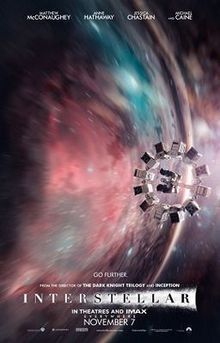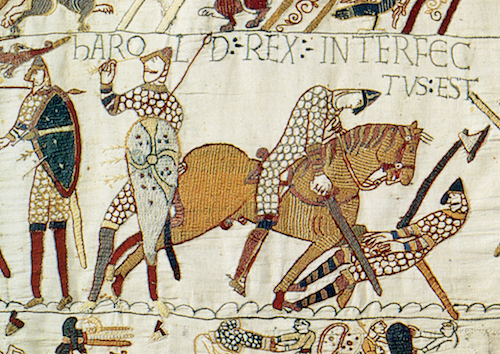Discovery Institute's Blog, page 200
December 18, 2014
Interstellar Unwittingly Argues that Permitting Design Inferences Is Necessary to Good Science
 Well, I finally got around to seeing Interstellar, the movie about how humanity evacuates Earth to escape a deadly blight on the land and in particular on food crops. An email correspondent wrote to us here, asking if the film says or implies anything relevant to intelligent design. I think it does -- but not intentionally.
Well, I finally got around to seeing Interstellar, the movie about how humanity evacuates Earth to escape a deadly blight on the land and in particular on food crops. An email correspondent wrote to us here, asking if the film says or implies anything relevant to intelligent design. I think it does -- but not intentionally.
I known, I know, it's only a movie. If you've seen it then I hope that the following will make perfect sense to you. If you haven't seen it, I hope I don't spoil it for yo...
According to New Research, Hummingbirds Have More Tricks Up Their Shoulder Bones
Hummingbirds, those iridescent jewel-like flyers that adorn our gardens and sip from our feeders, give more evidence of design than we were previously aware.
Insect-Like Flight
Researchers at Vanderbilt University found that the wing flaps of hummingbirds are more like those of insects than other birds. Modeling their motions with a supercomputer, they found that the wingbeats create "invisible vortices of air that produce the lift they need to hover and flit from flower to flower."
You might...
December 17, 2014
Political Scientist Asks, "Should Dogs Be Citizens?"

The mainstream media sure do love anti-human exceptionalism. I have written about how the New York Times will seemingly publish any idea and promote any cause that would destroy the unique value of human life.
Now Vox has joined the list, publishing an interview with Will Kymlicka, a professor (of course!) of political philosophy who wants to make all domestic animals citizens of our societies. Why should animals be citizens? From "Should Dogs Be Citizens?":
The first idea is that we've brough...
More Serious Problems with Representation in the Brain: Remembering the Battle of Hastings

P.Z. Myers has responded to my observations that neuroscience is rife with conceptual confusion. His reply is typical of dodgy materialist tropes -- "neuroscience proves materialism" and the like. He offers no cogent response to my observation that "storing" memories in the brain is unintelligible, and frankly no cogent reply was expected.
Memories are not the kind of things that can be stored. Representations of memories can be stored, and representations of all kinds are stored on computer...
What About the Actual Data We Have Been Acquiring About Exoplanets?

Editor's Note: As a series at ENV, we are pleased to present "Exoplanets." Daniel Bakken is anengineer who teachesastronomy at the college level, and an entrepreneur in compound semiconductor crystal growth. In a series of articles he critically examines recent claims about exoplanets beyond our solar system, asking whether our own planet Earth is a rarity, or common, in the cosmos. For previous articles in the series, see here.
 "Earthlike exoplanets" are a favorite subject of science and pop...
"Earthlike exoplanets" are a favorite subject of science and pop...
December 16, 2014
Biological Information, a Mile and a Half Beneath the Ocean Floor
Scientists sent a drill to the lowest depths under the sea ever reached, and found a surprise: living organisms. How did they get there? The BBC relays the questions the scientists are asking:
"Were these microbes just in a swamp, and loving life in a swamp, because there is all sorts of carbon available, oxygen, organic matter... and then that gets buried?" pondered Dr Trembath-Reichert."It could be that they didn't get a chance to escape -- they couldn't exactly walk out. So is it that they...
Understanding Memories: Lovely Metaphors Belong in Songs, Not Science

Biologist P. Z. Myers doesn't agree with my observation that the notion that the brain stores memories makes no sense. Myers writes:
Egnor claims that it is impossible for the brain to store memories. Yes, he knows that neural damage can cause loss of memory, that certain delicate areas of the brain, if harmed, can destroy the ability to make new memories, and he waves those awkward facts away to announce that there is simply no way memory or information of any kind can be stored in a meat-or...
In Bioethics, Infanticide Is Now "Debatable"

The late Richard John Neuhaus famously wrote of bioethicists:
Thousands of medical ethicists and bioethicists, as they are called, professionally guide the unthinkable on its passage through the debatable on the way to becoming the justifiable until it is finally established as unexceptionable.
In my over twice years engaged in trying to push back against the bioethics movement, I have found that to be an absolutely accurate formula.
Take,asone example, dehydrating the cognitively devastated to...
December 15, 2014
My Top Five Science and Faith Christmas Gifts for 2015

Bill Nye "the Science Guy" has just published a new book claiming that "perhaps there is intelligence in charge of the universe, but Darwin's theory shows no sign of it, and has no need of it." Earlier this fall, renowned physicist Stephen Hawking told an interviewer that he is "an atheist" because "before we understand science, it is natural to believe that God created the universe. But now science offers a more convincing explanation."
The endless repetition of such claims has led to a sit...
Newly Discovered Convergent Genetic Evolution Between Bird and Human Vocalization Poses a Severe Challenge to Common Ancestry
Everyone is familiar with the striking ability of certain birds (such as parrots) to vocalize speech, much as humans do. Well, according to the new papers published in Science that I wrote about earlier, confirming that birds arose explosively, those vocalization abilities are the result of "convergent evolution" at both the morphological and genetic levels.
Nature News reports, "The authors also conclude that vocal learning may have evolved independently in the ancestors of parrots, humming...
Discovery Institute's Blog
- Discovery Institute's profile
- 15 followers





